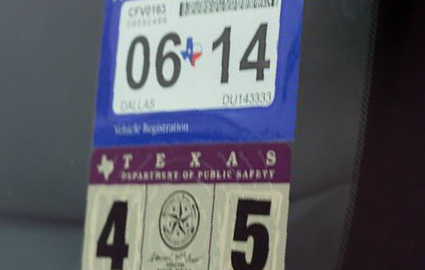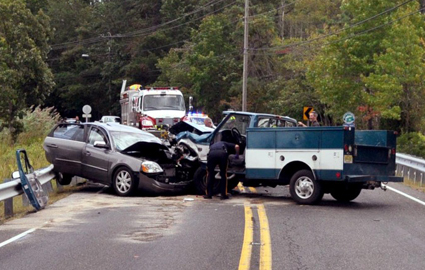Texas Titles

Texas Titles
In order to legally drive on a Texas roadway, one of the many documents a driver is required to have is a “certificate of title” for his or her vehicle. The government requires a person to be certified for just about everything these days, ranging from practical activities like driving to irrational states of mind like insanity.
A motor vehicle's “certificate of title” is an issued document that includes the name and address of the purchaser and seller at the first sale, or the transferee and transferring person at a subsequent sale.
Also included is the make of the motor vehicle, the body type of the vehicle, the manufacturer's permanent vehicle identification number of the vehicle or the vehicle's motor number if the vehicle was manufactured before the date that stamping a permanent identification number on a motor vehicle was universally adopted, the serial number for the vehicle, the number on the vehicle's current Texas license plates, if any, a statement that no lien on the vehicle is recorded or of the name and address of each lienholder and the date of each lien on the vehicle, listed in the chronological order in which the lien was recorded, a space for the signature of the owner of the vehicle, a statement indicating rights of survivorship under Texas law, if the vehicle has an odometer, the odometer reading indicated by the application for the certificate of title and any other information required by the department. When somebody buys or sells a car, he or she really has to jump through all kinds of hoops made of paper-cuts and frustration just to leave footprints for the government to keep track of who has owned what vehicles.
A certificate of title must bear the following statement on its face:
"UNLESS OTHERWISE AUTHORIZED BY LAW, IT IS A VIOLATION OF STATE LAW TO SIGN THE NAME OF ANOTHER PERSON ON A CERTIFICATE OF TITLE OR OTHERWISE GIVE FALSE INFORMATION ON A CERTIFICATE OF TITLE."
Fiction isn't a genre the Texas Department of Transportation appreciates when dealing with their titles.
In the state of Texas, a person who sells a motor vehicle and holds the general distinguishing number issued under the Texas Transportation Code must, in the time and manner provided by law, apply, in the name of the purchaser of the vehicle, for the registration of the vehicle, if the vehicle is to be registered, and a certificate of title for the vehicle. The seller must also file with the appropriate designated agent each document necessary to transfer title to or register the vehicle and at the same time remit any required motor vehicle sales tax. Apologies if that blew your mind. There's a reason lawyers go to school for years to understand these things.
Basically, when you sell your car, you have to make sure the car gets registered and titled in the name of the person who is buying the car as well as pay any sales tax involved with the transfer. Wasn't that easier to say? Yes. Yes, it was, but if it were meant to be easy then the state of Texas wouldn't have chapters and chapters of this information.
The above doesn't apply to vehicles that have been declared a total loss by an insurance company in the settlement or adjustment of a claim. It also doesn't apply to a vehicle that has had its certificate of title surrendered in exchange for a salvage vehicle title, a non-repairable vehicle title, a certificate of authority, or an ownership document issued by another state that is comparable to an ownership document issued in Texas. Vehicles with a gross weight in excess of 11,000 pounds are also excluded from this law. If it's too messed up then it's exempt from this process.
Once you've acquired insurance for your motor vehicle and it has passed inspection, applying for a certificate of title is a fairly easy process that mostly involves a lot of waiting. When I got back to Texas from living in Florida for six months, I had to go through the process myself. I had to go through it more than once because I wasn't aware of everything I had to do before applying for a certificate of title so it's really fresh on my mind.
The first step is getting insurance followed by getting your car inspected. Once you've done both of those things, you take your proof of insurance and proof that your vehicle passed inspection to the tax assessor-collector's office in your area. In Montgomery County, they had some nice ladies up front that make sure you have all of the necessary paperwork before waiting in line. That way, you don't waste your time waiting in line just to get turned away. The first time I went into the tax assessor-collector's office, I had no idea what I needed to get a certificate of title, but one of the ladies up front informed me of what I needed and could even tell me that my Florida insurance was not up to Texas standards so I had to get insured by a Texas insurance company before I could apply for a certificate of title.
Once I got Texas-based insurance and my car passed inspection, I returned to the tax assessor-collector's office with proof of each, waited in line for just a few minutes and handed over the paperwork along with a registration fee to one of the clerk's so she could work her magic to get my certificate of title processed and issued.
It's simple. It's easy. And there's really no excuse to go without it when you're in Texas.
Reasons to take Comedy Driving Defensive Driving
- Flexible Schedule
- Email Delivery Available
- Unlimited Log-ins
- State Approved
- No Final Exam
- Animated Course
- Free Audio and Video
- Comedic Course
- Live Phone Support
- No Hidden Fee’s








